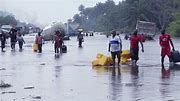Illinois is facing a daunting challenge in its battle against invasive Asian carp, with Lake Michigan at stake. Last week, state officials made a bold move by acquiring a 50-acre riverbed in Chicago to prevent these destructive fish from entering the Great Lakes. The plan involves constructing a $1.1 billion barricade known as the Brandon Road Interbasin Project.
The urgency to act swiftly stems from the looming threat posed by the invasive carp species, which could wreak havoc on the delicate ecological balance of Lake Michigan and its surrounding waterways. Don Jodrey, director of federal relations for the Alliance for the Great Lakes, expressed concern over delays in securing necessary lands:
“Those lands are needed right now.”
The longer Illinois waits, the greater the risk of an ecological catastrophe in one of North America’s largest freshwater ecosystems.
The Asian carp invasion represents a significant environmental and economic threat to Illinois and beyond. With their voracious appetite and rapid reproduction rates, these fish outcompete native species for food and habitat. Scientists have observed an alarming abundance of silver and bighead carp along stretches of the Illinois River – a concerning sign of their potential impact on local biodiversity.
Cory Suski, an environmental scientist at the University of Illinois Urbana-Champaign who has extensively studied these invasive carp, describes them as a relentless force:
“It’s hard to really put into words until you’ve seen thousands of carp in the air jumping out of the water.”
Apart from being disruptive under water, silver carp’s characteristic high jumps pose dangers to boaters and anglers navigating affected water bodies.
Despite their northward advance slowing down near Lake Michigan due to possible pollutants in Chicago’s wastewater effluent deterring them, experts remain vigilant about preventing any further incursion towards this vital ecosystem. Austin Happel from Shedd Aquarium emphasizes that there may be undisclosed factors influencing this behavior:
“There’s likely something unaccounted for that is keeping this specific group of fish from migrating further.”
Illinois has explored various unconventional strategies to control these invasive fish over decades, such as incentivizing commercial fishing operations and promoting culinary uses for carp meat. However, none match the scale or sophistication of the Brandon Road project—a multi-layered defense system designed to repel carp using electric shocks, acoustics blasts, bubble curtains, and innovative lock mechanisms.
Nevertheless, challenges loom large over this ambitious project due to concerns about polluted project sites which could significantly escalate costs for remediation efforts. Both past administrations under Rauner and Pritzker have expressed apprehensions about potential financial burdens falling on taxpayers if hazardous substances are discovered during construction activities.
Faith Bugel from Sierra Club highlights ongoing legal battles aimed at holding responsible parties like Midwest Generation accountable for environmental violations related to coal ash disposal practices across multiple sites in Illinois. As negotiations continue between stakeholders regarding cleanup responsibilities post-project completion; uncertainties persist regarding funding distribution among involved entities.
In conclusion; Illinois finds itself at a critical juncture where immediate action is imperative to safeguard vital freshwater resources against encroaching ecological threats posed by invasive carp species.









Leave feedback about this